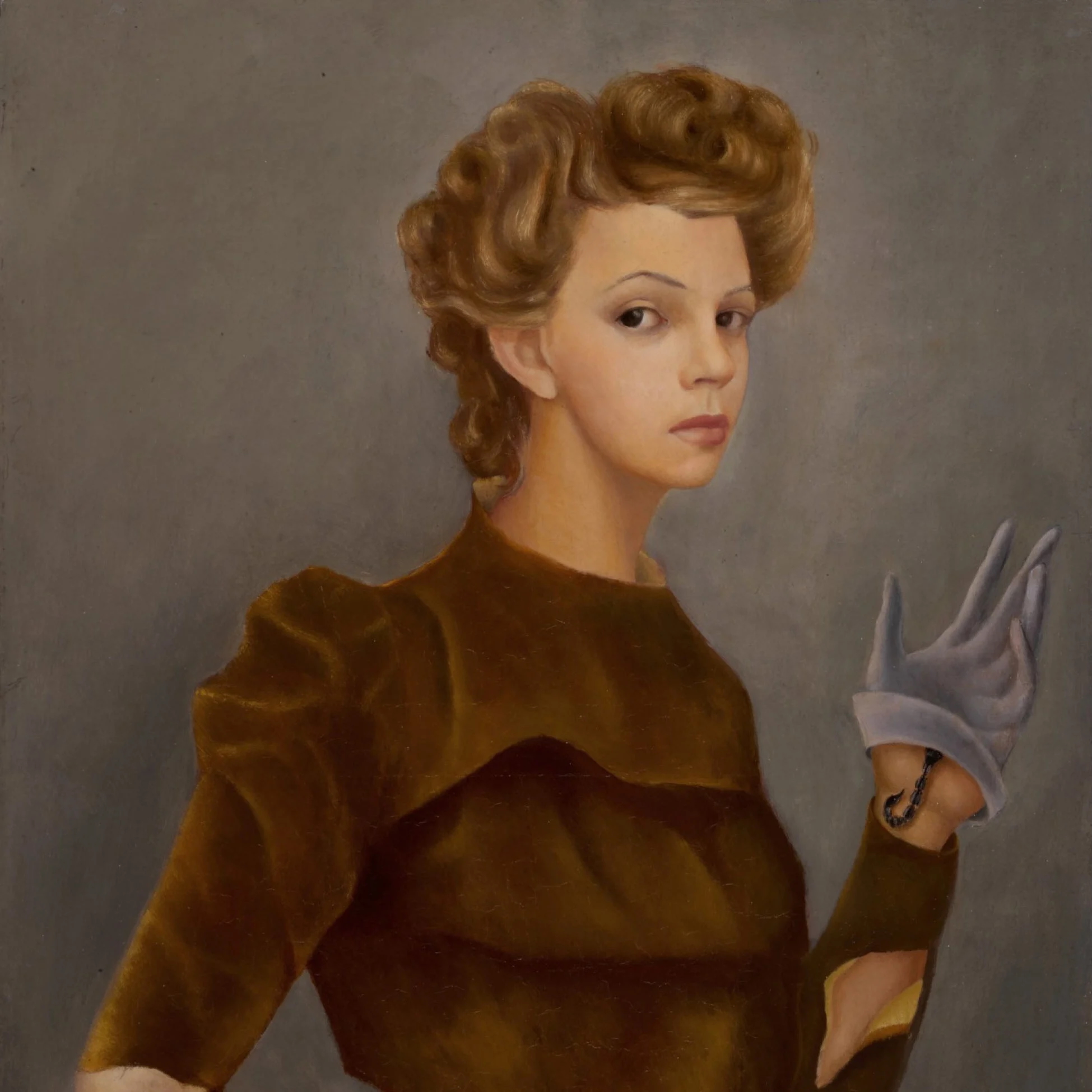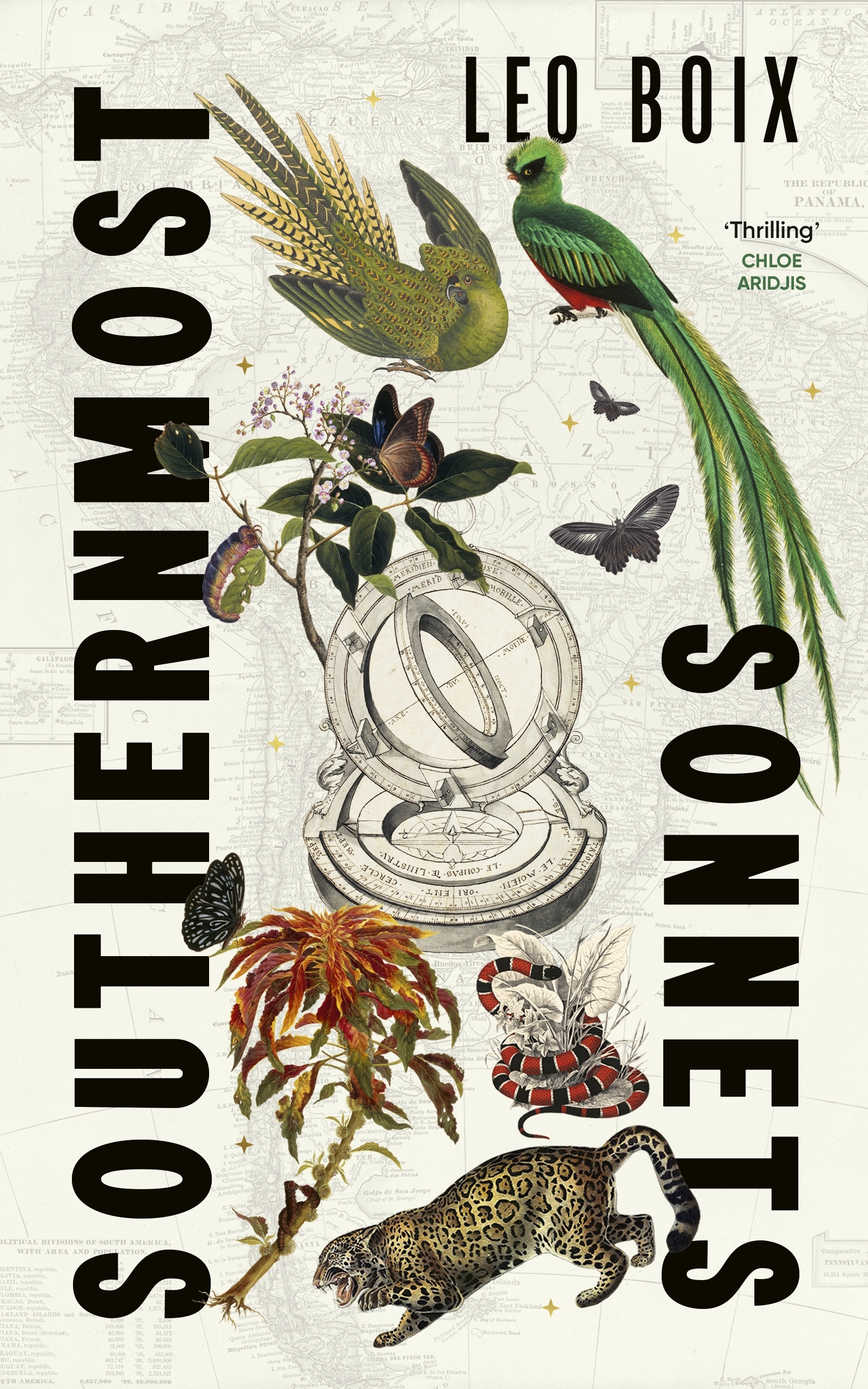Rehearsal / 42. Leo Boix / Seven ways South.
![]()
Leonor Fini, ‘Autoportrait au scorpion,’ detail (1938).

Leonor Fini, ‘Autoportrait au scorpion,’ detail (1938).
14 (Leonor Fini, Autoportrait au Scorpion, 1938)
She looks straight at us with that defiant gaze of hers.
Her hair is up with big hazel curls, her sculpted curls.
She’s had her hair done and told an elderly coiffeur
about a recurrent dream of a dying Argentinean girl.
As she’s about to leave, she puts her little grey gloves on,
gloves of soft suede that suddenly catch the last light;
the same pearly gloves hide her secret, the scorpion
filled with venom to defend herself. She’s ready to bite.
Unlike Mother, whose biting pincers were taken away
for her own good, the day Father and Doctor decided
not to tell her about her deadly illness and then prayed
for her health to improve. That’s exactly what they did.
Like Leonor Fini in her self-portrait,was she also defiant
as she faced her final hour, or was she willing, compliant?
26
There was a pine at the end of our street, a huge monster
called Mañío macho. Police cars went round in circles, sharks
of dark blue light, always on patrol. Every morning, a beggar
or two, singing cumbias. My sister with a wrong birthmark.
The moon used to grow gigantic, and it reddened. It appeared
above the murky River Plate. We often called it la luna macabra.
The buildings in town had mouths and ears. We whispered
to them all magic words, but no answers. Was it abracadabra ?
Once, a witch woman (la curandera) touched a child’s back
with a measuring tape, counted the days left of a hidden serpent.
There were flowers the size of giant hands, and spiders. At dusk,
some locals painted their faces with white chalk, like insurgents.
I remember pyres made of old tyres, furious flames whirled.
The fire tall enough to be seen from the other side of the world.
34
‘There, we built a new town and called it Bonas Aeieres
that is, in our German, Guter Wind, though the air was vile.
From Hispania, we brought livestock: 72 horses and mares.
Here, also, we found a place inhabited by an Indian tribe.
They brought us fish and meat to eat. These Querandíes
have no houses, but wander about, as do the Gipsies
with us at home . . . and when they meet with wild deer
and other beasts, they drink their blood, and get tipsy.
And when they first came to our town, Bonas Aeieres,
and attacked us, some of them tried to storm the town,
others shot fiery arrows at our straw-covered houses,
which were set on fire, and the whole place burnt down.’
As written by Ulderico Schmidt, the German adventurer,
who joined Pedro de Mendoza’s expedition to get richer.
37 (from the British Museum)
A musical horn from the mysterious deserts of the Altiplano
A wool rope, with leather attached, made somehow by the Aymara
A plumed arrow from the Amazon that killed a Conquistador
A pottery vessel unearthed at midnight in Atacama
A bolas of three weights bound by a lost Gaucho from the Andes
A figurine made of a shell found by chance in the Gulf of Darien
A knotted armband with toucan feathers from the shores of Vaupés
A stone tool made by a blind Indian boy from Neuquén
A mythic terracotta black ‘fire cloud’ vessel from Colombia
A man’s dancing cloak worn by the witches of Paraguay
A blade and a spear-head found somewhere in Patagonia
A Colonial coin used by sightseers and healers, uncovered in Uruguay
A gold bracelet with motifs of vengeful felines from Nasca
A bronze jaguar figure pulled from a temple ruin in Cuzco
42
The Harpy eagle emerges from the rainforest, like a goddess
crisscrossing the vast highlands of South America. She flies
over the woodland borders. A perfect huntress of the forests
with slate-black feathers and the most fulgurous of eyes:
grey, bright red, alight! A rare queen, her head crowned
with a double crest, named for that half-human, half-bird
hybrid from Greece, a spirit carrying the dead to a mound
in Hades, snatching souls away, swooping, much feared.
She’s soaring away from humans now, the elusive Harpy eagle
of the neotropics, rising from the Mata Atlântica, the Amazon,
clenching with her large talons pin monkeys and electric eels
to feed the hungry gods awaiting her in the clouds at dawn.
And when she ascends above the dwindling jungles,
people think they see that other monster—hungry, insatiable.
47
In 1590, the worst plague in South American history struck.
It halted the Jesuits’ teaching. Priests withdrew southwest,
down the Ypané River to Paraguay, praying for better luck,
for the good days of conversions at Pope Gregory’s request.
But despair set in. Converting the Indians—a hopeless cause.
All Paraguay’s Jesuits were summoned to a crisis concilium
in Argentina. There was no future for their saintly exercise
so, according to their superior, a father called Paéz, the teaching
had to be abandoned. It was too risky for the holy reverends
from the order of Loyola, who asked for those ‘who strive
to serve as soldiers of Almighty God, to fight for the sole defence
of the faith, and for the progress of souls in Christian life.’
Not a simple decision, Father Paéz tells us, since ‘the Jesuits lost
two hundred thousand Indians, all ripe for the kingdom of Christ.’
56 (South American butterflies)
Eurytides columbus, Morpho achillaena,
Eresia anieta, Stalachis phlegia,
Catagramma cynosura, Ageronia velutina,
Eurytides dolicaon, Colias lesbia,
Papilio homothoas, Agrias sardanapalus,
Papilio menatius, Eresia simois,
Papilio androgeus, Catoblepia berecynthus,
Papilio himeros, Heliconius phyllis,
Lemonias zygia, Battus belus,
Leucochimona icare, Papilio neyi,
Livendula aminias, Battus ingenuus,
Argyrogrammana occidentalis, Callithea hewitsoni,
Mesene bomilcar, Euselasia cuprea,
Ancyluris rubrofilum, Heliconius narcaea.
Order a copy of Boix’s
Southernmost: Sonnets.
Leo Boix is a bilingual Latinx poet born in Argentina, based in the UK. His debut English collection, Ballad of a Happy Immigrant (Chatto & Windus, 2021), was a Poetry Book Society ‘Wild Card’ Choice, and named one of The Guardian’s best five poetry books of 2021. His second English collection, Southernmost: Sonnets, was published in June 2025 and hailed by The Telegraph, The Guardian and The Morning Star for its lyrical intensity and fearless exploration of queer, diasporic experience. He has also published two Spanish collections in Argentina, and edited Hemisferio Cuir: An Anthology of Young Queer Latin American Poetry (2025). A fellow of The Complete Works, Boix co-directs Un Nuevo Sol, serves on the Poetry Translation Centre and Magma Poetry boards, and contributes a monthly literary column to The Morning Star, ‘Letters from Latin America.’ His awards include the Bart Wolffe Poetry Prize, Keats-Shelley Prize, PEN Award and the Society of Authors’ Foundation grant.
Southernmost: Sonnets.
Leo Boix is a bilingual Latinx poet born in Argentina, based in the UK. His debut English collection, Ballad of a Happy Immigrant (Chatto & Windus, 2021), was a Poetry Book Society ‘Wild Card’ Choice, and named one of The Guardian’s best five poetry books of 2021. His second English collection, Southernmost: Sonnets, was published in June 2025 and hailed by The Telegraph, The Guardian and The Morning Star for its lyrical intensity and fearless exploration of queer, diasporic experience. He has also published two Spanish collections in Argentina, and edited Hemisferio Cuir: An Anthology of Young Queer Latin American Poetry (2025). A fellow of The Complete Works, Boix co-directs Un Nuevo Sol, serves on the Poetry Translation Centre and Magma Poetry boards, and contributes a monthly literary column to The Morning Star, ‘Letters from Latin America.’ His awards include the Bart Wolffe Poetry Prize, Keats-Shelley Prize, PEN Award and the Society of Authors’ Foundation grant.



